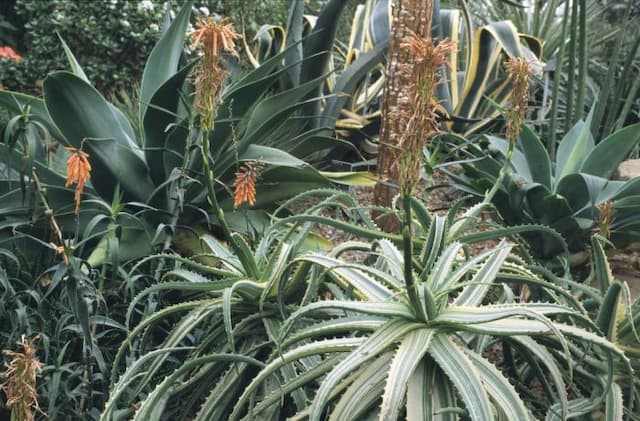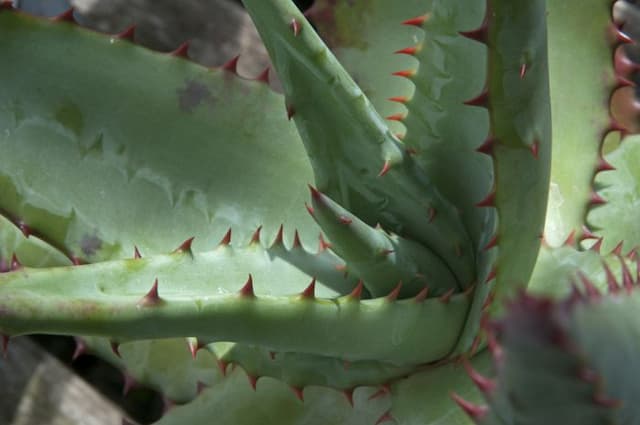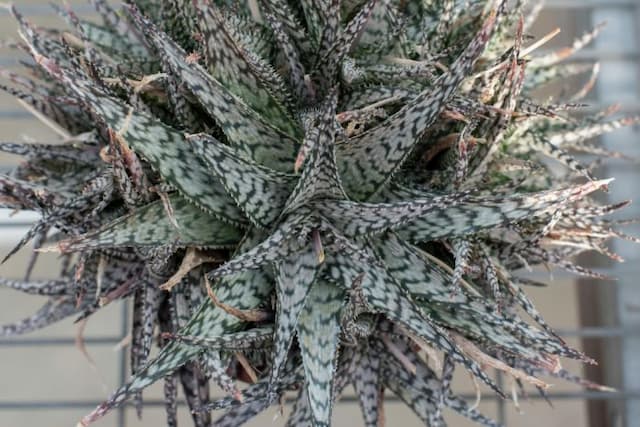Red Hot Poker Kniphofia 'Elvira' (PBR)

ABOUT
The Kniphofia 'Elvira', commonly known as Red Hot Poker or Torch Lily, is a striking perennial known for its distinctive flower spikes. The plant boasts vibrant blossom clusters that range in color from fiery red to bright orange, giving the appearance of a flaming torch. These flower spikes are carried on sturdy, upright stems that rise above a clump of grass-like, green foliage. The leaves are slender and arching, forming a mounded tuft of lush greenery at the base of the plant. The blooms of the Red Hot Poker are tubular and densely packed in a raceme at the tip of each stem. They typically appear in gradient shades, with the bottom flowers adopting a deeper hue and the top blooms transitioning into lighter tones, creating a two-toned effect that adds to their visual interest. This color gradient also suggests the look of a flickering flame, drawing attention to the plant in any garden setting. The blooming period is during the warmer months, adding a burst of color to the garden when many other plants have yet to flower or have finished their bloom cycle. Overall, the Red Hot Poker 'Elvira' possesses a bold and architectural quality, making it an excellent choice for adding vertical interest and a splash of hot colors to borders, beds, and mixed plantings. Its striking appearance provides a warm, tropical feel, and it is often visited by hummingbirds and other pollinators that are attracted to its showy blooms.
About this plant
 Names
NamesFamily
Asphodelaceae
Synonyms
Torch Lily, Red Hot Poker, Poker Plant
Common names
Kniphofia 'Elvira' (PBR)
 Toxicity
ToxicityTo humans
Red hot poker is generally not considered toxic to humans. However, as with many plants, it can cause mild irritation if the sap comes into contact with skin or if any part of the plant is ingested. It is not known to cause serious poisoning or severe symptoms in humans. Caution should still be exercised to avoid ingestion, particularly by children, and handling the plant with care to prevent any potential irritation.
To pets
Red hot poker is also not specifically listed as toxic to pets such as dogs and cats. However, it is always best to prevent pets from ingesting plants, as they might cause gastrointestinal upset or irritation. If a pet does consume parts of the red hot poker, symptoms like drooling, vomiting, or diarrhea may occur. If these or any other concerning symptoms arise, it is advised to consult with a veterinarian.
 Characteristics
CharacteristicsLife cycle
Perennials
Foliage type
Evergreen
Color of leaves
Green
Flower color
Orange
Height
2 feet 6 inches (0.76 meters)
Spread
1 foot 6 inches (0.46 meters)
Plant type
Herb
Hardiness zones
6
Native area
South Africa
Benefits
 General Benefits
General Benefits- Attracts pollinators: The bright flowers of 'Elvira' Red Hot Poker attract bees, butterflies, and hummingbirds, providing food for these beneficial creatures.
- Drought tolerance: Once established, Kniphofia 'Elvira' can withstand periods of drought, making it suitable for dry or water-wise gardens.
- Low maintenance: This plant requires minimal care once established, with little need for fertilization or pruning.
- Architectural interest: With its striking vertical flower spikes and grass-like foliage, it adds architectural interest to garden designs.
- Long blooming season: 'Elvira' Red Hot Poker produces flowers over a long period from early to late summer, ensuring vibrant color in the garden for an extended time.
- Cold hardiness: It is hardy to USDA zones 5 through 9, allowing it to thrive in a variety of climates.
- Deer resistance: Typically, deer do not prefer eating Kniphofia, making 'Elvira' a good choice for gardens in areas with deer populations.
 Medical Properties
Medical PropertiesThis plant is not used for medical purposes.
 Air-purifying Qualities
Air-purifying QualitiesThis plant is not specifically known for air purifying qualities.
 Other Uses
Other Uses- The dried, hollow stems of the Red Hot Poker can be used as natural biodegradable straws in garden parties or outdoor events, reducing plastic waste.
- In art, the vibrant flowers of the Red Hot Poker can serve as natural brushes for a unique painting technique where the flower spikes are dipped in paint and pressed against canvas.
- A creative plant stake, the sturdy stems of the Red Hot Poker can be pruned and used to support other less rigid plants within the garden during their growing season.
- These flowering spikes can be included in arrangements of dried flowers to add a dash of color and structural diversity to the composition.
- Dried flower heads of the Red Hot Poker can potentially be used in crafting, for instance as part of a natural potpourri or as accents in wreaths.
- For photographers and filmmakers, the distinct shape and bright coloration of Red Hot Poker can be utilized as an eye-catching subject in compositions or as set dressing in outdoor scenes.
- When conducting ecology or botany workshops, Red Hot Poker's unique structure and flowering pattern offer a vivid specimen for educational demonstrations.
- During autumn, the fading flowers of the Red Hot Poker can be left on the plant to provide visual interest in the garden, contributing to the seasonal aesthetic.
- As a natural pest control strategy, the Red Hot Poker can potentially attract predator insects that feed on garden pests, therefore serving as part of an integrated pest management approach.
- The Red Hot Poker can serve as a marker plant due to its height and distinctiveness, helping gardeners recognize specific locations or boundaries within a large garden space.
Interesting Facts
 Feng Shui
Feng ShuiRed Hot Poker is not used in Feng Shui practice.
 Zodiac Sign Compitability
Zodiac Sign CompitabilityRed Hot Poker is not used in astrology practice.
 Plant Symbolism
Plant Symbolism- Standout Appearance: Kniphofia 'Elvira', commonly known as Red Hot Poker, has a striking appearance with its bright, torch-like flowers that can symbolize standing out from the crowd or attracting attention.
- Vibrancy and Energy: The intense coloration of the Red Hot Poker's flowers often symbolizes vibrancy and high energy, reflecting the plant’s lively and bold presence in a garden.
- Passion and Desire: Reflecting its fiery appearance, the Red Hot Poker can represent strong emotions such as passion, desire, or even lust, indicating a burning intensity within.
- Endurance and Resilience: As a tough plant that can withstand various conditions, the Red Hot Poker symbolizes endurance and the ability to withstand challenges or adversity.
- Exotic Origins: The exotic look of the Red Hot Poker, originating from South Africa, can symbolize fascination with the foreign or the allure of the exotic and unknown.
 Water
WaterThe Red Hot Poker or Torch Lily requires consistent moisture, especially during the growing season. Water the plant deeply once every week, providing enough water so that it reaches the roots without leaving the soil waterlogged. In hotter, drier periods, you may need to water twice a week. Each watering session should aim for about one to two gallons of water, ensuring the soil is moist but not soggy. During winter, reduce watering as the plant enters dormancy.
 Light
LightRed Hot Pokers thrive in full sun, where they can receive at least 6 to 8 hours of direct sunlight daily. An ideal spot would be an open bed without shade from trees or buildings, which ensures the plant receives ample light throughout the day to encourage blooming. Avoid heavily shaded areas, as insufficient light can lead to poor flowering.
 Temperature
TemperatureRed Hot Pokers prefer a temperate climate with temperatures ranging between 50 and 90 degrees Fahrenheit. They can tolerate a minimum temperature close to freezing, but optimal growth occurs when the climate is not too cold. They are known to withstand temperatures as low as 20 degrees Fahrenheit but sustained cold may damage the plant.
 Pruning
PruningPruning Red Hot Pokers should primarily be done to remove spent flower stalks, which encourages further blooming. Cutting back the foliage in late fall or early winter -- after the plant has finished flowering and the leaves have died back -- helps maintain tidiness and prevents disease. Pruning is typically done once a year, during these specified times.
 Cleaning
CleaningAs needed
 Soil
SoilRed Hot Poker requires well-drained soil with a pH range of 6.0 to 7.0. A mix of loam, compost, and sharp sand or perlite encourages healthy growth.
 Repotting
RepottingRed Hot Poker should generally be repotted every 2 to 3 years, when signs of overcrowding or slowing growth are evident.
 Humidity & Misting
Humidity & MistingRed Hot Poker thrives in average humidity levels; it does not require any special humidity adjustments.
 Suitable locations
Suitable locationsIndoor
Red Hot Poker needs bright light, well-draining soil, and infrequent watering.
Outdoor
Plant in full sun, well-drained soil; water moderately.
Hardiness zone
6-9 USDA
 Life cycle
Life cycleRed hot poker 'Elvira' (Kniphofia 'Elvira' PBR) begins its life cycle as a seed, requiring stratification or a period of cold to break dormancy. Upon germination, the seedling emerges and develops a basal rosette of narrow, grass-like leaves. As the plant matures, it develops a strong, fleshy root system and foliage clump, preparing for perennial growth. In its flowering stage, typically in late spring to early summer, it sends up tall, sturdy flower spikes with tubular, brightly colored flowers ranging from red to orange and yellow. After blooming, the plant sets seed, which can be collected for propagation or will drop to the ground to potentially germinate. The plant eventually enters a period of dormancy in the cooler months, reducing above-ground growth and relying on its roots to survive the winter before beginning the cycle again in the following spring.
 Propogation
PropogationPropogation time
Spring-early summer
The Red Hot Poker 'Elvira' is typically propagated through division, which is best done in the spring. This is the most popular method because it is simple and effective for increasing the number of plants. To propagate by division, carefully dig up an established clump of Red Hot Poker, ensuring you lift a substantial amount of root mass. Using a sharp spade or knife, you should then divide the clump into smaller sections, each with at least one strong growing point. Plant these divisions immediately in well-prepared soil, at a depth similar to their previous growing conditions, and water thoroughly to establish. This method enables gardeners to quickly and efficiently create new plants that are true to the original in form and color.









